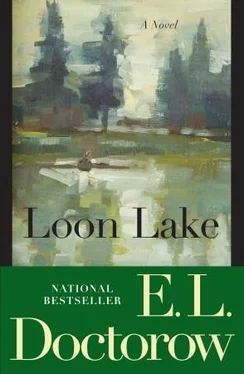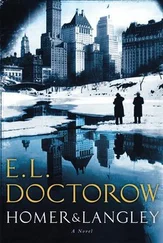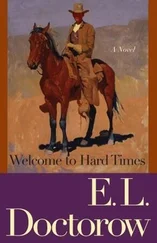when they walk over them into the plant and throw the switches.
And primly planning the action deploying forces
is a slim and swarthy man in overcoat and pearl-gray fedora
a dark-eyed man short but very well put together
friend of industrialists, businessman who keeps his word
and capable of a gracious gesture under the right conditions.
Only now, as with a gloved hand he beckons one of the strikers
an aged man with white hair and rounded shoulders
who has called out brothers don’t do this to your brothers
to meet him between the lines alone in no man’s land
does a small snapshot of rage light his brain.
He impassively demonstrates the function of the cobblestone
a sudden event on the workingman’s skull who has met him
surprised now at the red routes of death mapped on his forehead
turning to share this intelligence with his brothers
hand lifted too late as the signal for the engagement to begin.
And then the life quickened, suddenly the people in green were scurrying about purposefully, there even seemed to be more of them, and I knew without being told that the master of Loon Lake, Mr. F. W. Bennett, was in place.
One morning I was mucking out the stables. Two horses were made ready for riding. The wide doors swung open admitting a great flood of light, the horses were led out, and I caught a glimpse of her in jodhpurs, velvet riding jacket, she was fixing the strap of her riding helmet. The doors closed. I climbed over the stall gate and ran to a window. A bay flank and a shiny brown boot moved through my field of vision. I heard a man’s voice, a quiet word of encouragement, and then she, on her lighter mount, passed my eyes, the boot not quite secure in the stirrup.
I ran to the doors and put my eyes to the crack: the back and head of white hair were all I could see of Bennett before Clara’s figure loomed up on her fat-assed horse, she didn’t roll with its footfalls but took each one bumping, her black riding helmet slightly askew.
And then horses and riders passed behind some trees and were gone.
I raked shit.
In the evening I went to Mr. Penfield’s rooms and we listened to the scraps of dance music carried from the main house on the wind.
“I suppose I’ll be out of here tomorrow,” I said.
“What?” He had been staring into his wineglass.
“When it comes to his attention.”
“You can’t be sure, Joe of Paterson. I have made a great study of the very rich. The one way they are accessible is through their whim.” He swallowed some wine. “Yes. I have not told you this, but six or seven years ago when I came up here at night along the track, as you did, I knew where I was going. I had traced Frank Bennett to Loon Lake and I intended to kill him.”
“I have the idea myself,” I said. He didn’t seem to hear me.
“Mr. Bennett was amused. I was invited to remain on the grounds and write my poetry. Yes. And now you see me.”
“I do,” I said. “I see you.”
“I know what you think. You think living this way year after year and not going anywhere, not doing anything, I have lost my perspective. It’s true! It’s true. So that everything that happens, every, oh God”—his eyes go heavenward, he swallows some wine—“small thing, is monumentally significant. I know! I lie in wait like a bullfrog lying in wait for whatever comes along for his tongue to stick to. Yes. That’s the only part of me that moves, my tongue.”
He dropped his chin on his chest and stared at me with his bleary red eyes. “You want to hear me croak?”
“What?”
He emitted the sound of a bullfrog, never had I heard such a blat of self-disgust I didn’t want to. It was not one night like this but several I remember, sitting in his living room over the stables, piles of books on the floor, a desk covered with papers, composition notebooks the kind I used in school, clumps of dust on the floors, ashtrays filled to overflowing, ashes on the carpet, on the window seat, he drifts back and forth back and forth between the wine bottles and the window, and all the while Miss Clara Lukaćs dances rides swims dines in the provinces of Loon Lake, mysteriously advanced now to the rank of its mistress.
“I don’t think it’s a small thing,” I said. “I think it is monumentally significant.”
“Yes,” he says, and he pulls his chair closer to mine, “this is not the first acquaintance. And it has nothing to do with who I am or the way I look, it’s always the same — the immediate recognition I have for her when she appears, and the ease with which she comes to me whatever circumstances I’m in, whatever I’ve become. Because I have no particular appeal to women and I never have, except to this woman, and so the recognition must be mutual and it pushes us toward each other even though we don’t talk the same language. And so, you see, now again, even though I’m indisputably fatter and more ridiculous as a figure of love than I ever was. And even though” his eyes brimmed—“she is faithful to nothing but her own life.”
I didn’t know what he was talking about.
He struggled out of his chair and ran to his bookshelves, and not finding what he wanted, he disappeared into a closet from which came the sounds of crashing and falling things.
He stumbled out with a book in his hand. He blew the dust off. “I want you to have this,” he said, “my first published work, my first thin volume of verse”—he smiled unsmiled— “The Flowers of the Sangre de Cristo.” He did not hand me the book but examined it closely. “I printed it on a hand press and bound it myself in Nutley. It was my project for recovery, you see. The signatures in this one are out of order. But no matter, no matter.”
He pressed the volume on me now and looked in my eyes as if hoping to see the wisdom that would flow into them from the book.
“Just a minute,” he said. He ran back into the closet there was a terrible crash I jumped up but he came out coughing in a cloud of chalky dust waving his second published work. “This one too,” he said, slamming the closet door. He swallowed a great draught of wine and slumped back in his chair wheezing from the exertion.
I held the two slim volumes, the second included a Japanese woodprint as frontispiece. “Don’t read them now, don’t ask me to watch you as you read them,” he said.
I held the books, I could not help granting him the authority he craved as profound commentator on his own life — he was an author! Never mind that he published his books himself, I was impressed, nobody I ever knew had written a book. I held them in my hand.
Apart from everything else and despite the shadows of the wishes in my mind the vaguest shadows of the implementation of the wishes, I am moved to be so set up in the world with such a distinguished friend. I know he is a posturing drunk, how could I not recognize the type, but he has made me his friend, this poet, and I have a presence in the world.
He tells me his one remaining belief.
“Who are you to doubt it,” he says angrily, “a follower of trains in the night!”
I don’t doubt it I don’t. I have listened to his life, heard it accounted indulged improved incanted and I believe it all. It is a life that goes past grief and sorrow into a realm, like the life of a famous gangster or an explorer, where sudden death is the ordinary condition. And somehow I’m invited to engage my instinct not to share his suffering but to marvel at it, a life farcically set in the path of historical and natural disaster it comes to me as entertainment—
The war before the war before the war
Before the rise of the Meiji emperor
Before the black ships—
Читать дальше











